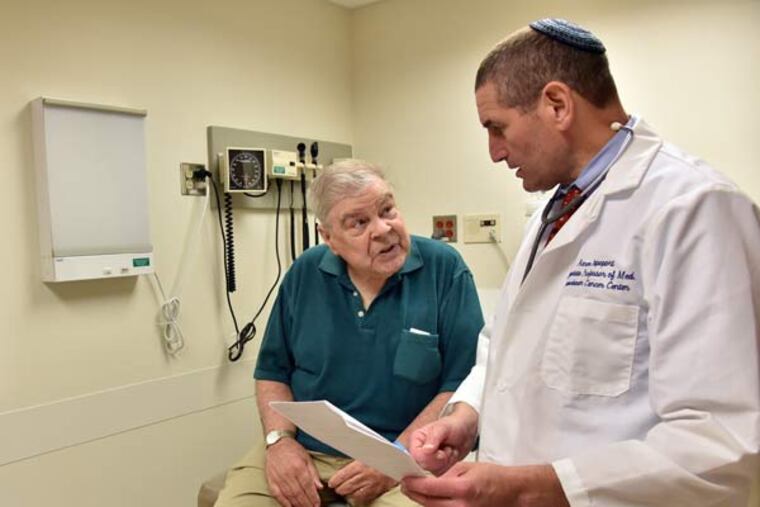Clinical trial uses the body’s own immune cells to fight cancer
“I thought for sure I was dying,” Melley said. “I thought it was the end of me.”

BALTIMORE — Feeling suddenly sick to his stomach one evening, Marty Melley rushed to the bathroom, where he grabbed the toilet to vomit and then blacked out.
"I thought for sure I was dying," Melley said. "I thought it was the end of me."
At the hospital, doctors eventually tested Melley's blood and determined that he had multiple myeloma, an incurable cancer of the plasma cells.
Blood plasma cells are the linchpin of the immune system, making the antibodies that recognize and attack infections. The cancer manifests itself in bone marrow as cancerous cells disrupt the production of normal blood cells. The disease weakens the bones and can cause kidney problems.
Doctors told Melley he might live three to five years with the cancer. That was 13 years ago.
Melley believes he benefited from a clinical trial he participated in through the University of Maryland School of Medicine and the University of Maryland Marlene and Stewart Greenebaum Cancer Center.
In the trial, doctors altered the patients' T cells — a variety of the white blood cells, which are the agents of the body's immune system — to attack and kill the cancer. Cancer cells often survive because the immune system, which protects the body from infections and disease, can't identify them as something dangerous.
Patients participating in the trial, including Melley, experienced much longer periods of remission, when the cancer is significantly reduced or even appears absent.
Dr. Aaron P. Rapoport, the lead author on the research, published in the online version of Nature Medicine last month, believes the treatment could be life-changing for the 77,000 people in the United States who have the disease and the 24,000 diagnosed with new cases each year.
So far, the longest a patient in the study has remained in remission is three years. The study was done in conjunction with researchers at the University of Pennsylvania and its Abramson Cancer Center.
"Even the patients who had a temporary response had many clinical benefits they might otherwise have not," said Rapoport, professor of medical oncology at the University of Maryland School of Medicine.
The research is the latest in the growing field of immunotherapy, which uses the patients' immune system to fight cancer. The therapy often works better than common cancer treatments like chemotherapy and stem cell transplants, particularly in patients with late-stage cancer, said Dr. Elizabeth Jaffee, deputy director of the Sidney Kimmel Comprehensive Cancer Center at Johns Hopkins.
The Food and Drug Administration has approved immunotherapy drugs for several cancers, including lung and prostate cancers and the skin cancer metastatic melanoma.
Immunotherapy works by boosting the immune system to work better at attacking cancer cells or by marking cancer cells to make them easier to find by white blood cells.
In the University of Maryland study, the patients underwent a stem cell transplant to harvest their T cells. They then received an infusion of about 2.4 billion of their re-engineered T cells.
To fight off infection, T cells use a protein on their surface to attach to diseased cells. But T cells often don't recognize the specific marker on the cancer cell that identifies it as diseased. The re-engineered T cell has a protein, known as a receptor, designed to recognize the cancer cell marker.
The modified immune cells made their way to the bone marrow, where myeloma tumors are found, and were able to fight the tumors over a long period of time, the researchers found.
Melley was also involved in an earlier study at the University of Maryland in 2003 that involved activated patient-derived T cells that were not genetically modified but were administered in conjunction with a pneumonia vaccine. He joined the newest trial in 2012 when his cancer recurred.
In the most recent trial, Rapoport and the other researchers used technology developed by the English biotechnology firm Adaptimmune Therapeutics to re-engineer the T cells.
The trial treated 20 people, and 14 of those — 70 percent — went into remission within three months. Half the patients were treated in Maryland and the other half in Pennsylvania.
Rapoport said they plan to do larger clinical trials examining the same therapy.
Melley, now 76, recently began taking chemo pills again after three years in remission, as the cancer has started to reappear. But he said the two T cell trials helped give him more life than he ever dreamed after his diagnosis. He is most happy he has gotten to watch his grandkids grow up.
"I have been the luckiest guy in the world," he said. "Everything they tried for me has worked."
———
©2015 The Baltimore Sun
Visit The Baltimore Sun at www.baltimoresun.com
Distributed by Tribune Content Agency, LLC.